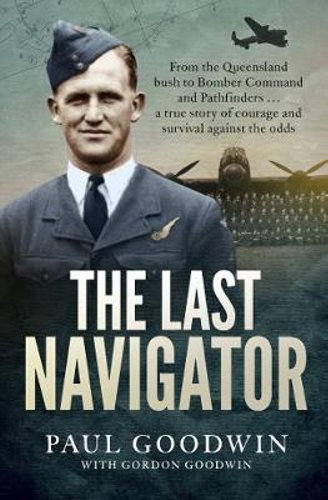The Last Navigator is the story of RAAF navigator, Gordon Goodwin, a member of RAF Bomber Command during the Second World War.

The book details the history of the Bombing Campaign against Nazi Germany and the occupied territories from 1942, with sections on life in pre-war Queensland and the Empire Air Training scheme and ‘life’ in Canada during training. Paul Goodwin, the son of The Last Navigator, drawing on his father’s memoirs has written the book in, as he describes it in the Author’s Note, ‘his voice, as it is his history’.
Not only does the book draw on the memoirs of Gordon Goodwin, written in 1997, but also on his “extensive library of books on Bomber Command, interviews recorded with he and his 7 Squadron Skip, Phillip Patrick, his logs, his other documents and a lifetime of conversations with him”. The product is a fascinating, informative book, the story taking the reader from country Queensland during the Depression, to New South Wales for training as a navigator, to Canada, via a flight with Atlantic Ferry Command to Britain and ultimately Bomber Command. Within this narrative is the story of two loves, one in Canada, who is to be left behind, the other his future wife.
The majority of the book feels less memoir and more history, taken from many sources, including Don Charlwood’s Journeys into Night, with which The Last Navigator bears many similarities. The well-researched history within Goodwin’s book, presented and referenced proficiently, from which much of the history of Bomber Command and some of the personalities involved can be learned, provides an excellent background to Gordon Goodwin’s story.
It is this writer’s opinion that while this work of Paul Goodwin is both of interest and a worthwhile read, the format diminishes the whole. The virtual novelisation of history presented as memoir is, I believe, purely aimed at sales; the change back and forth in the presentation of history to or from what is ‘memoir’, whether of Gordon Goodwin, his wife or other contributors, often feels like a change in author. I do, however, believe this book has a place alongside books about Bomber Command, but suggest the reader look at Charlwood’s memoir first for the story of an Australian navigator from Bomber Command.
Reviewed by Mark Moore for Reconnaissance, The Magazine of the Military History Society of New South Wales Inc
Contact MHHV Friend about this article.






